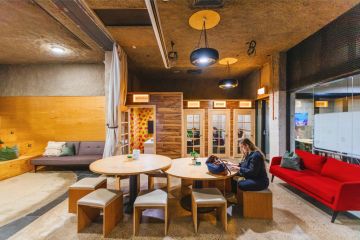Regional NSW calls for new residents as part of 'Evocities' campaign
City residents are being called on to discover the benefits of regional New South Wales.
The councils of seven regional centres– Albury, Armidale, Bathurst, Dubbo, Orange, Tamworth and Wagga Wagga– are behind the “Evocities” campaign, which encourages more Australians to move to the country.
The campaign is supported by the latest data recorded by the Australian Unity Wellbeing Index, which shows those who live in rural and regional areas tend to be happiest. The term “Evocity” comes from the idea that each city is a centre for energy, vision and opportunity (EVO).
Evocities spokesperson and Mayor of Dubbo Mathew Dickerson says with the cost of living in Sydney nearly twice the rate of other capital cities, there has never been a better time to move to an Evocity.
“With Sydney’s soaring median house price hitting the $1 million mark … it’s the perfect time to consider making the move to an Evocity where house prices are dramatically more affordable,” Dickerson says.
“The average median house price of all seven Evocities is $357,571 and with the abundance of land on offer in our regional cities, you can get a bigger and better home for your money, potentially improving your quality of life.”
Solicitor Rhys Bower, wife Kate and their son Spencer made the move to Wagga Wagga (via a short stint in Holbrook, NSW) from Canberra in 2012. Kate grew up in Holbrook (approximately one hour’s drive from Wagga Wagga) but had been living in Canberra for the past 12 years.
“For me, I could do most of my research for my PhD working from home, so a move to the country seemed ideal,” Bower says.
“Having lived in the city all my life I was also keen to see what life in the country was like.”
Having family nearby has been a great support for the young family, but Bower says meeting people and settling into Wagga Wagga has been “easy”.
“I cold-called a firm in Wagga Wagga just as two solicitors were leaving for retirement and maternity leave,” Bower says.
Although the hunt to find a dream home is always a challenging process, the lower median house price point allowed the couple to be “fussier” with their decision.
“Housing is much more affordable than it is in the bigger cities,” Bower says.
“Other than that, petrol is a bit pricier, but then you never pay for parking, [and] we don’t have the cheap dining that you find in Melbourne and Sydney.” In fact, the only place in Wagga Wagga where it’s even possible to pay for parking (there are no parking meters in town) is at the airport.
The schools in the town have also impressed the Bowers, who now have three young children: Spencer, Tilly and Rafferty.
“We have been blown away by how progressive the school is,” Bower says.
It is a complete myth that things are backwards in regional towns relative to in the city; [it’s] certainly not the case with our school.”
Overall, the move has afforded the couple an improved work/life balance.
“I can go home for lunch, go to school events, to medical appointments with the kids and it is all a five minute drive away with no parking hassles,” Bower says.
“Life in a regional town is nothing like the perception of life in a regional town.”

Real estate agent Bobby Gardner and his wife Nicola also moved to Wagga Wagga in 2011, previously living on Avoca Beach on the central coast of NSW.
Although the population of Wagga Wagga is much larger (approximately 60,000 compared to Avoca Beach’s 4300), the town is significantly more isolated.
“Moving to Wagga Wagga was a hard move but once we had visited a few times and experienced the lifestyle it was easy to make the decision,” Gardner says.
“With both of us having real estate backgrounds we found employment extremely quickly, in fact, with the same company.”
The couple do miss the beach but Gardner says Wagga Wagga has delivered in all other aspects, with several other family members and friends also making the move.
“We were amazed when we moved here the value for money in property and living costs,” Gardner says.
Fed up with the daily commute from Geelong to Melbourne, personal assistant Vanessa Kelly and her husband Matthew and their two children moved to Albury in 2014.
“Our lifestyle in the city was crazy; Matthew had to leave home at 6am to reach work by 8am. What should be a 45-minute commute was rarely less than two hours due to the heavy, congested traffic heading towards the city, and coming home wasn’t any better,” Kelly says.
“A regular eight-hour working day could easily become 12 hours with travel.”
Other factors that motivated the move included the cost of housing, education, childcare facilities, along with the lifestyle and community.
“We have two young children, one of whom is of primary school age, the other a toddler attending fulltime childcare,” Kelly says.
“Had we decided to remain in our previous location, we were facing extensive waiting lists for childcare and kindergarten, with very few choices for primary and secondary schooling.”
Mr Kelly had been travelling to Albury once a month for work, but the couple spent a couple of weekends visiting the town to the move to research schools and neighbourhoods before moving.
We didn’t know a single soul when we moved here …18 months on, we are home within 15 minutes of work finishing each day and we have now purchased six acres and are building our dream home, something we never could have achieved in our previous city, Kelly says.
“We go back to the city to visit friends and family around every five weeks, and with a three-hour commute it is easy to do this, however as great as it is to go for a visit, we can’t wait to get home to Albury.”
Since the campaign’s launch in 2010, Evocities has received more than 4493 inquiries regarding moving, attracted more than 329,387 visits to Evocities.com.au and more than 1.37 million visits to evojobs.com.au.
It is reported that more than 2375 households have moved to one of the seven cities.
We recommend
We thought you might like
States
Capital Cities
Capital Cities - Rentals
Popular Areas
Allhomes
More







